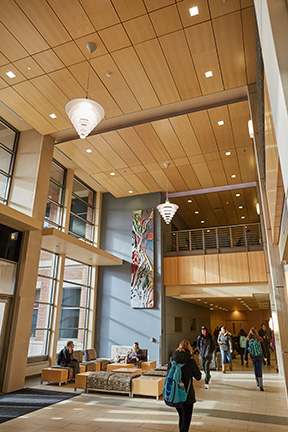Posted 2:52 p.m. Friday, Dec. 9, 2016

UW-La Crosse reduces energy consumption, saves money, receives recognition.
UW-La Crosse reduces energy consumption, saves money, receives recognition
UW-La Crosse’s energy consumption in 2015 was 12.7 percent lower than a decade ago. That’s according to a Wisconsin Department of Administration report that summarizes annual energy use in all state facilities. The report sets fiscal year 2005 as a baseline and makes adjustments for weather and total campus square footage. Because of UWL’s dedication and performance in energy efficiency and renewable energy, the university was given one of about 60 awards worldwide this fall from the Association of Energy Engineers, a non-profit professional association with more than 18,000 members. Energy consumption is measured in British Thermal Units per Gross Square Foot (BTU/GSF). A BTU is the amount of work needed to raise the temperature of one pound of water by one degree Fahrenheit. In 2005 the total adjusted BTU/GSF at UWL was 150,442. By 2015 this number dropped by 12.7 percent to 131,324 BTU/GSF. The success of UWL’s energy saving efforts is the result of people across campus who operate, maintain, and occupy the approximate three million square feet of building space, says Dan Sweetman, UWL’s safety and sustainability manager. Specifically, UWL’s Facilities, Planning and Management office has shown a strong commitment to finding opportunities to save on energy and budgets, whether through new green building designs or modern, energy efficient updates to lights, water heaters, faucets and more. [caption id="attachment_47545" align="alignright" width="288"] A combination of high efficiency lights and natural light have reduced energy consumption in Centennial Hall, UWL’s academic building. In this picture the wall mounted sconce lights and the numerous recessed ceiling lights in the two-story gathering area work with the natural light sensors and timers to allow a large area to be lit while consuming less energy. [/caption]
UWL’s new buildings such as Centennial Hall academic building, Eagle Hall residence hall and the new student union — are built with sustainability and energy efficient designs that meet the national green building certification standards of Leadership in Energy & Environmental Design (LEED). Features such as natural lighting and white rooftops translate to less energy to light and cool buildings. LEED building are about 25 percent more energy efficient than a comparable new building constructed at the same time but not built to LEED standards, says Sweetman.
Multiple energy-saving projects across campus have also translated to budget savings. Examples include:
A combination of high efficiency lights and natural light have reduced energy consumption in Centennial Hall, UWL’s academic building. In this picture the wall mounted sconce lights and the numerous recessed ceiling lights in the two-story gathering area work with the natural light sensors and timers to allow a large area to be lit while consuming less energy. [/caption]
UWL’s new buildings such as Centennial Hall academic building, Eagle Hall residence hall and the new student union — are built with sustainability and energy efficient designs that meet the national green building certification standards of Leadership in Energy & Environmental Design (LEED). Features such as natural lighting and white rooftops translate to less energy to light and cool buildings. LEED building are about 25 percent more energy efficient than a comparable new building constructed at the same time but not built to LEED standards, says Sweetman.
Multiple energy-saving projects across campus have also translated to budget savings. Examples include:
- Saving about $46,000 per year – Installed Variable Frequency Drives, which allow Facilities, Planning and Management to control fan operating time and speed.
- Saving about $187,000 per year — Installed low flow shower heads in 10 residence halls and the Recreational Eagle Center.
- Currently saving about $53,000 per year — Replacing 32 Watt bulbs with 25 Watt bulbs in all UWL buildings. This project is about three-quarters complete, which represents a total of about 25,000 lamps, each representing a 20 percent drop in energy consumption.
- Turn off computers, monitors, printers, peripherals and other non-essential office equipment. If in use, shut off the power strip rather than each item individually.
- Turn off all table lamps, general room lighting, and other electrical items.
- Unplug and clean office refrigerators; block the door slightly ajar to reduce odor buildup.
- Unplug chargers when they’re not charging.
- Close shades, blinds and curtains during unoccupied periods.
- Encourage reducing energy use.
